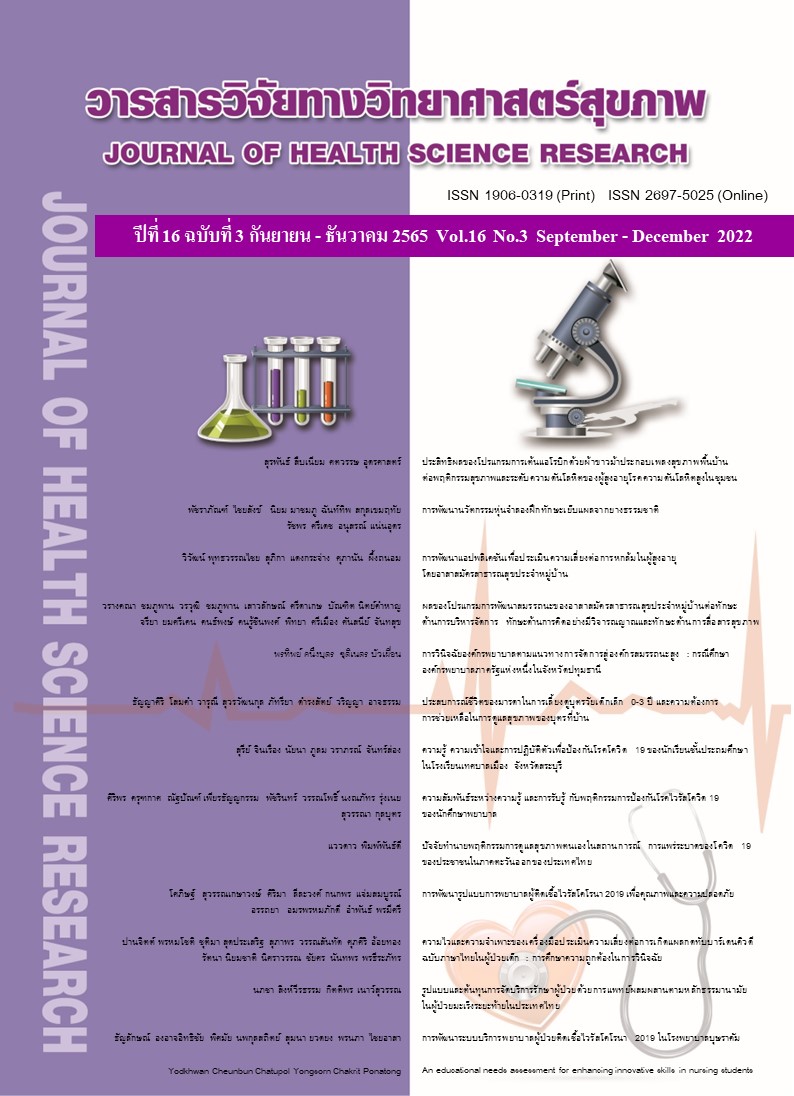การประเมินความต้องการทางการศึกษา ในการเสริมสร้างทักษะนวัตกรรมในนักศึกษาพยาบาล english
Main Article Content
บทคัดย่อ
บทนำ : การศึกษาถึงความความต้องการทางการศึกษาของนักศึกษาพยาบาลในการพัฒนาทักษะด้านนวัตกรรมในรายวิชานวัตกรรมการพยาบาลในหลักสูตรพยาบาลศาสตรบัณฑิต ช่วยส่งเสริมสมรรถนะของพยาบาลในอนาคต
วัตถุประสงค์การวิจัย : เพื่อศึกษาสภาพปัจจุบันและความต้องการของทักษะการพัฒนานวัตกรรม และเพื่อระบุความจำเป็นในการพัฒนานวัตกรรมของนักศึกษาพยาบาลคณะพยาบาลศาสตร์ สถาบัน
พระบรมราชชนก
วิธีการวิจัย : การวิจัยเชิงบรรยาย ตัวอย่างเป็น นักศึกษาพยาบาล สุ่มตัวอย่างแบบชั้นภูมิ จำนวน 380 คน ที่ลงทะเบียนเรียนในปีการศึกษา 2565 จากวิทยาลัยที่ถูกคัดเลือกเป็นตัวอย่างในการศึกษา การรวบรวมข้อมูลใช้แบบสอบถามการประเมินความต้องการด้านทักษะนวัตกรรมจำนวน 49 ข้อ วิเคราะห์ข้อมูลเชิงปริมาณด้วยสถิติเชิงพรรณนาและ Modified Priority Needs Index (PNIModified) ใช้ในการจัดลำดับความต้องการด้านทักษะนวัตกรรม
ผลการวิจัย : คะแนนเฉลี่ยโดยรวมของทักษะนวัตกรรมในปัจจุบันและที่ต้องการคือ 3.86 (SD=0.51) และ 4.26 (SD=0.74) ตามลำดับ คะแนน PNIModified ภาพรวมเท่ากับ 0.10 โดยค่าคะแนน PNIModified รายทักษะเรียงลำดับจากมากไปน้อย คือ ด้านการค้นพบนวัตกรรม (PNIModified = 0.13) ด้านการนำนวัตกรรมไปใช้ (PNIModified = 0.10) ด้านการออกแบบนวัตกรรม (PNIModified = 0.09) ด้านการพัฒนานวัตกรรม(PNIModified = 0.08) และการเขียนโครงร่างนวัตกรรม (PNIModified = 0.06) คะแนน PNIModified รายข้อสูงสุดสามอันดับแรกอยู่ในทักษะด้านการค้นพบนวัตกรรม
สรุปผล : ความสามารถด้านนวัตกรรมอาจจะเป็นสมรรถนะที่สำคัญที่สุดสำหรับพยาบาลในอนาคต ดังนั้นอาจารย์พยาบาลจึงควรออกแบบหลักสูตรและหลักสูตรเพื่อเพิ่มขีดความสามารถเชิงนวัตกรรมของนักศึกษาพยาบาล
Downloads
Article Details

อนุญาตภายใต้เงื่อนไข Creative Commons Attribution-NonCommercial-NoDerivatives 4.0 International License.
บทความที่ได้รับการตีพิมพ์เป็นลิขสิทธิ์ของวิทยาลัยพยาบาลบรมราชชนนี จังหวัดนนทบุรี
ข้อความที่ปรากฏในบทความแต่ละเรื่องในวารสารวิชาการเล่มนี้เป็นความคิดเห็นส่วนตัวของผู้เขียนแต่ละท่านไม่เกี่ยวข้องกับวิทยาลัยพยาบาลบรมราชชนนี จังหวัดนนทบุรี และคณาจารย์ท่านอื่น ในวิทยาลัยฯ แต่อย่างใด ความรับผิดชอบองค์ประกอบทั้งหมดของบทความแต่ละเรื่องเป็นของผู้เขียนแต่ละท่าน หากมีความผิดพลาดใด ๆ ผู้เขียนแต่ละท่านจะรับผิดชอบบทความของตนเองแต่ผู้เดียว
เอกสารอ้างอิง
Tulyakul P, Meepring S. Revolution of nursing science in the next decade. Glob J Health Sci. 2021;13(4):32-7. doi: 10.55 39/gjhs.v13n4p32.
Chen J, Yin X, Mei L. Holistic innovation: An emerging innovation paradigm. Int J Innov Stud. 2018;2(1):1-13. doi: 10.1016/j .ijis.2018.02.001.
Economic and Social Commission for Asia and the pacific. Evolution of science, technology and innovation policies for sustainable development: the experience of China, Japan, the Republic of Korea and Singapore. Republic of Korea: United Nations Publication; 2018.
Jones C, Pimdee P. Innovative ideas: Thailand 4.0 and the fourth industrial revolution. Asian Int J Soc Sci. 2017;17(1): 4-35. doi: 10.29139/aijss.20170101.
Sungtong E. Thailand 4.0 and higher education: Redesigning roles of university in Thailand. Proceedings of the 3rd International seminar on higher education. 3rd November 2018; Pekanbaru Indonesia; Pascarjana Universitas Riau; 2018. p.37-49. [Internet]. 2018 [cited 2021 Jul 9]; Available from: https://repository.unri.ac.id/handle/
/9692.
American Association of Colleges of Nursing. The essentials: Core competencies for professional nursing education. [Internet]. 2021 [cited 2021 Jul 9]; Available from: https://www.aacnnursing.org/AACN-Essen tials/Download.
Thailand Nursing and Midwifery Council. Thailand standard qualifications framework for undergraduate program in nursing science. [Internet]. 2017 [cited 2021 Jul 9]; Available from: https://www.tnmc.or.th/
images/userfiles/files/4_%20Thailand%20Standard%20Qualifications%20Framework%20for%20Undergraduate%20Program%20in%20Nursing%20Science.docx.
Cusson RM, Meehan C, Bourgault A, Kelley T. Educating the next generation of nurses to be innovators and change agents. J Prof Nurs. 2020;36(2):13-9. doi: 10.1016/j.profnurs.2019.07.004.
Gao L, Lu Q, Hou X, Ou J, Wang M. Effectiveness of a nursing innovation workshop at enhancing nurses’ innovation abilities: A quasi‐experimental study. Nurs Open. 2022;9(1):418-27. doi: 10.10 02/nop2.1080.
Liu HY, Chang CC, Wang IT, Chao SY. The association between creativity, creative components of personality, and innovation among Taiwanese nursing students. Think Skills Creat. 2020;35: 100629. doi: 10.1016/j.tsc.2020.100629.
Ovbiagbonhia AR, Kollöffel B, Brok PD. Educating for innovation: students’ perceptions of the learning environment and of their own innovation competence. Learn Environ Res. 2019;22(1):387-407. doi: 10.1007/s10984-019-09280-3.
Wongyai W, Patphol M. Growth mindset development of learners in 5G era. Thailand: The Graduate school of Srinakharinwirot university. [Internet]. 2020 [cited 2021 Jul 9]; Available from: http://www.curriculumandlearning.com/upload/Books/Growth%20mindset%205G%20part1_1578298484.pdf. (in Thai).
Sari DM, Wardhani AK. Critical thinking as learning and innovation skill in the 21st century. J Eng Lang Pedagogy. 2020;3(2): 27-34. doi: 10.36597/jelp.v3i2.8778.
Wrahatnolo T, Munoto. 21st centuries skill implication on educational system. In Abadi A. Mustofa A. Wibawa SC. editors. Proceeding of the IOP Conference series: Materials Science and Engineering; 22th -23th May 2017; Universitas Negeri Surabaya, Indonesia: IOP Publishing; 2018. p. 1-7. doi: 10.1088/1757-899X/296/1/012036.
Songkram N, Songkram N, Chootongchai S, Samanakupt T. Developing students’ learning and innovation skills using the virtual smart classroom. Int J Emerg Technol Learn. 2021;16(4):34-51. doi: 10.3991/ijet. v16i04.15221.
Koyuncuoglu D. An investigation of potential leadership and innovation skills of university students. Int J Educ Math Sci Technol. 2021;9(1):103-15. doi: 10. 46328/ijemst.1374.
Gowanit C, Thawesaengskulthai N, Sophatsathit P, Chaiyawat T. Information technology systems of service process innovation. ARPN J Eng Appl Sci. 2015; 10(2):488-98.
Wongwanich S. Needs assessment research (4th ed.). Thailand: Chulalongkorn University Press; 2019. (in Thai).
Zhong Z, Hu D, Zheng F, Ding S, Luo A. Relationship between information-seeking behavior and innovative behavior in Chinese nursing students. Nurse Educ Today. 2018;63:1-5. doi: 10.1016/j.nedt.2018.01.004.
Kongmuang P, Thawesaengskulthai N. Improvement of telematics solution for motor insurance in Thailand by 5D innovation development process. In: Chan FTS. editor. Proceeding of the 6th International Conference on Industrial Engineering and Applications (ICIEA). 12th-15th April 2019; Tokyo, Japan: IEEE press: p. 6-11. doi: 10.1109/ IEA.2019.87 15152.
Seow O, Tiong E, Teo K, Silva A, Wood KL, Jensen DD, et al. Design signatures: Mapping design innovation processes. Proceeding of the 30th International Conference on Design Theory and Methodology. 26th-29th August 2018; Canada. Quebec City: Quebec; p.1-19. doi: 10.11 15/DETC2018-85758.
Hawryszkiewycz I, Alqahtani A. Integrating open innovation process with the double diamond design thinking model. In Garcia-Perez A. Simkin L. editors. Proceeding of the 21st European Conference on Knowledge Management. 2nd-4th December 2020; Coventry University, UK: Academic Conferences International Limited; 2020. p. 1003-XV. doi: 10.34190/ EKM.20.703.
Songwatthanayuth P, Pheetarakorn P, Klinhom P. Development of an instructional program for enhancing nursing innovative ability among nursing student. Hua Hin Medical Journal. 2021;6(2):12-25. (in Thai).
Klaichun P, Trirat P. Innovatorship enhancement model for undergraduate programs of private universities in Thailand. Journal of Social Science and Buddhistic Anthropology. 2021;6(8):236-52 (in Thai).
Jamjan L, Mamark N, Srilamai N. Portfolio: Thinking process and innovation of nursing students. Nursing Journal of the Ministry of Public Health. 2020;30(3):1-9 (in Thai).


